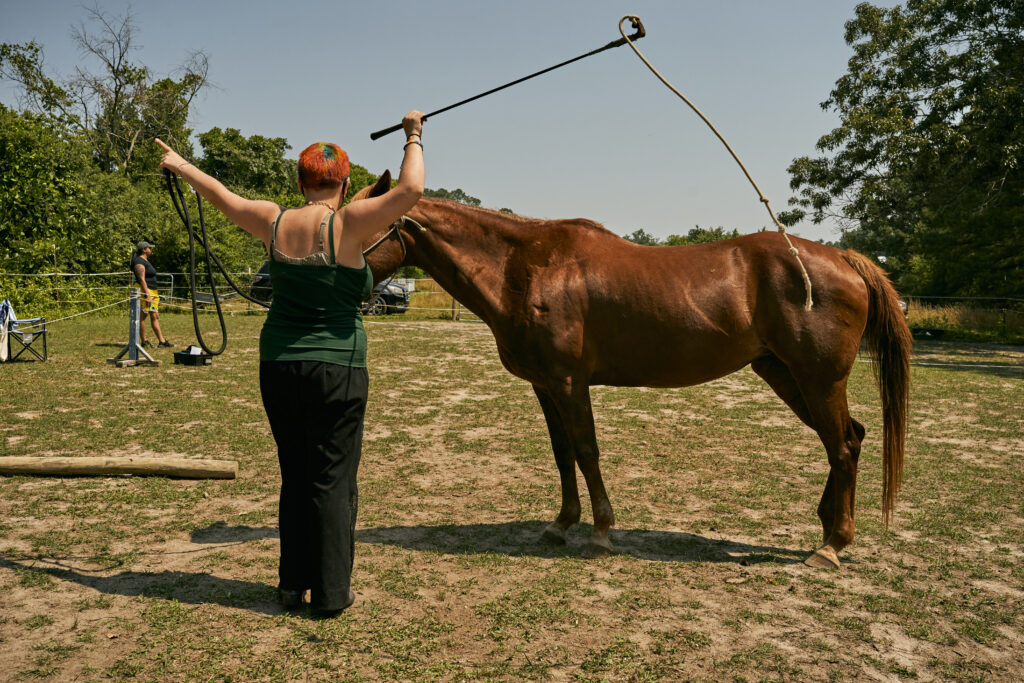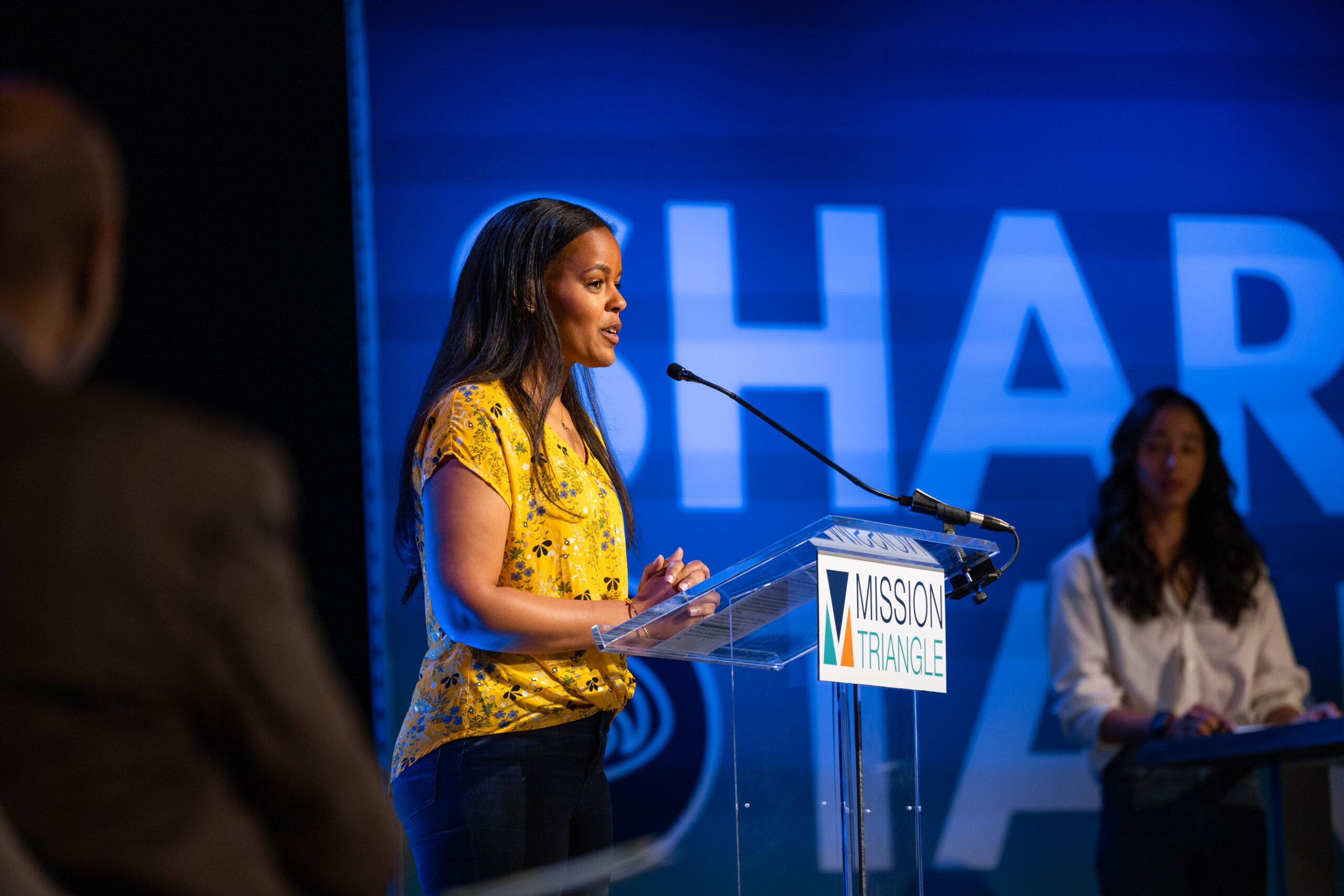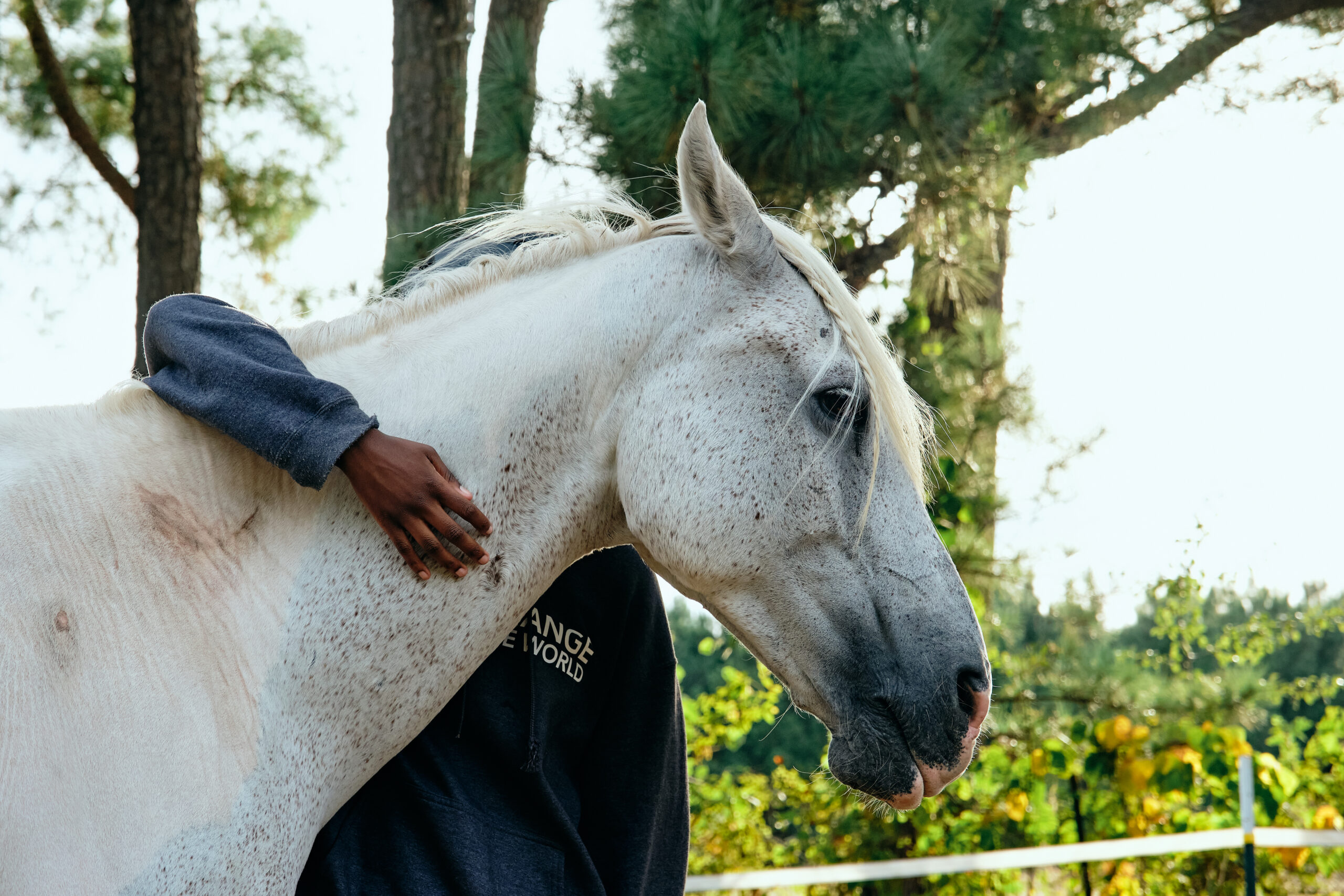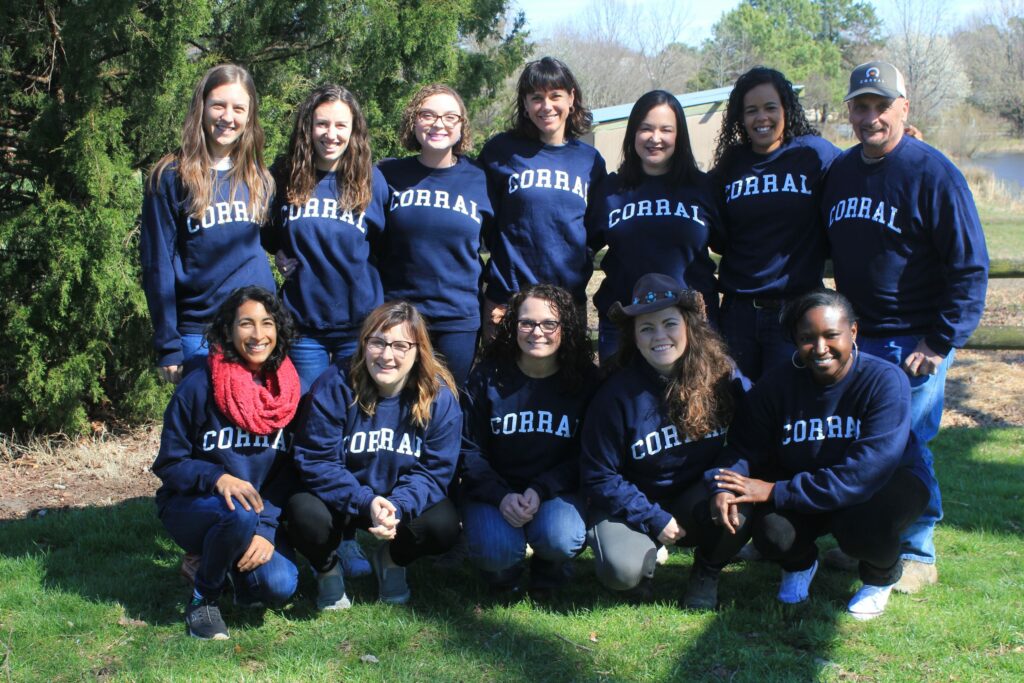Finding Balance: What Horses Can Teach Us About Mental Health
By: Joy Currey, CORRAL Founder
May is Mental Health Awareness Month, a time to reflect on the ways we care for our minds, emotions, and overall well-being. For those of us who live and breathe horses, it’s also an opportunity to notice how deeply our mental state is intertwined with the lives of our equine partners. Whether you’re a competitive rider, a recreational horse owner, or simply someone who finds peace in a horse’s presence, one principle always rises to the top: balance.
The Balance of the Horse
In riding, balance is everything. A horse who is mentally balanced will be physically balanced. A horse that is physically balanced will be mentally balanced. Get to the balance of the body and you access the balance of the mind. A balanced horse moves with ease, responds with softness, and develops strength without tension. A horse out of balance—whether due to poor conditioning, unclear communication, or emotional distress—will show it in their posture, behavior, and ability to connect.
The Balance of the Human
Humans are no different. We often think of balance in terms of time management—work, family, exercise, rest—but real balance goes deeper. It’s about being grounded in who we are, aware of our emotions, and able to respond rather than react. It’s about holding space for both joy and grief, progress and mistakes, ambition and rest.
Mental health is not just the absence of illness; it’s the presence of resilience, self-awareness, and emotional regulation—skills that horses continually invite us to practice. They ask us to show up authentically, to notice what we’re bringing into the arena or the barn, and to adjust when we’re off center.
Just like horses, our physical balance supports our mental balance. In The Body Keeps the Score: Brain, Mind, and Body in the Healing of Trauma, Dr. Bessel van der Kolk discusses physical balance as a key component in trauma recovery, though not always in the way we might think of it in sports or biomechanics. His emphasis is more on how trauma disrupts the body’s ability to feel safe, grounded, and connected to itself—and how restoring physical regulation is foundational for healing.
How Horseback Riding Helps Girls at CORRAL Find Balance—in Body, Mind, and Life
At CORRAL, balance is more than therapy or a riding skill. For the girls in our program, balance is a path toward healing, empowerment, and self-discovery. And through horseback riding, that path becomes real—felt in the body, mirrored in the horse, and carried into daily life.
The Physical Side of Balance
Every girl who rides at CORRAL learns that balance on a horse isn’t just about staying upright. It’s about finding center. Learning to move with the horse instead of against it. Feeling your seat bones, adjusting your posture, and breathing with awareness.
Many of our girls come into the arena carrying the weight of trauma—physical tension, hypervigilance, or a disconnect from their own bodies. On horseback, those patterns begin to shift. The rhythmic motion of the horse, the need for soft focus, and the physical cues of balance all combine to bring the rider into the present moment. In a world where trauma often pulls the body into the past, that’s a powerful thing.
Emotional and Mental Balance
But balance cannot just be understood physically. At CORRAL, we guide girls to notice what’s happening inside them—not with judgment, but with curiosity. Riding becomes a space where they learn how to self-regulate. How to respond rather than react. How to be firm without being harsh, and soft without being afraid.
This kind of balance—the ability to hold boundaries with kindness, to show up with both strength and empathy—is what so many of our girls take with them into their lives outside the barn.
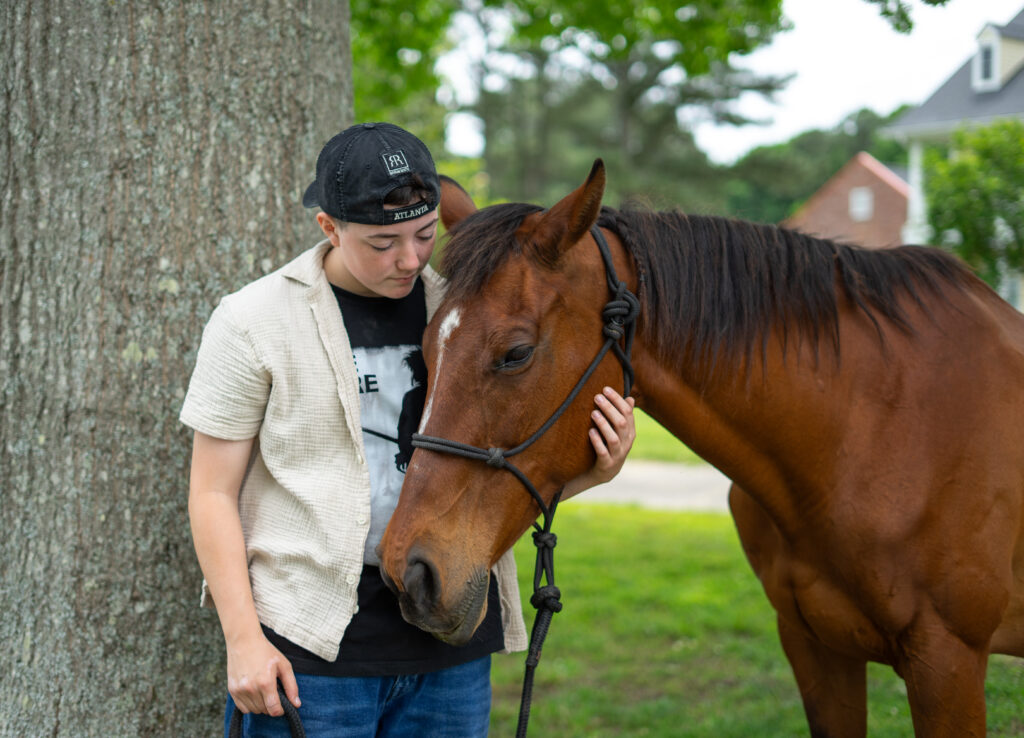
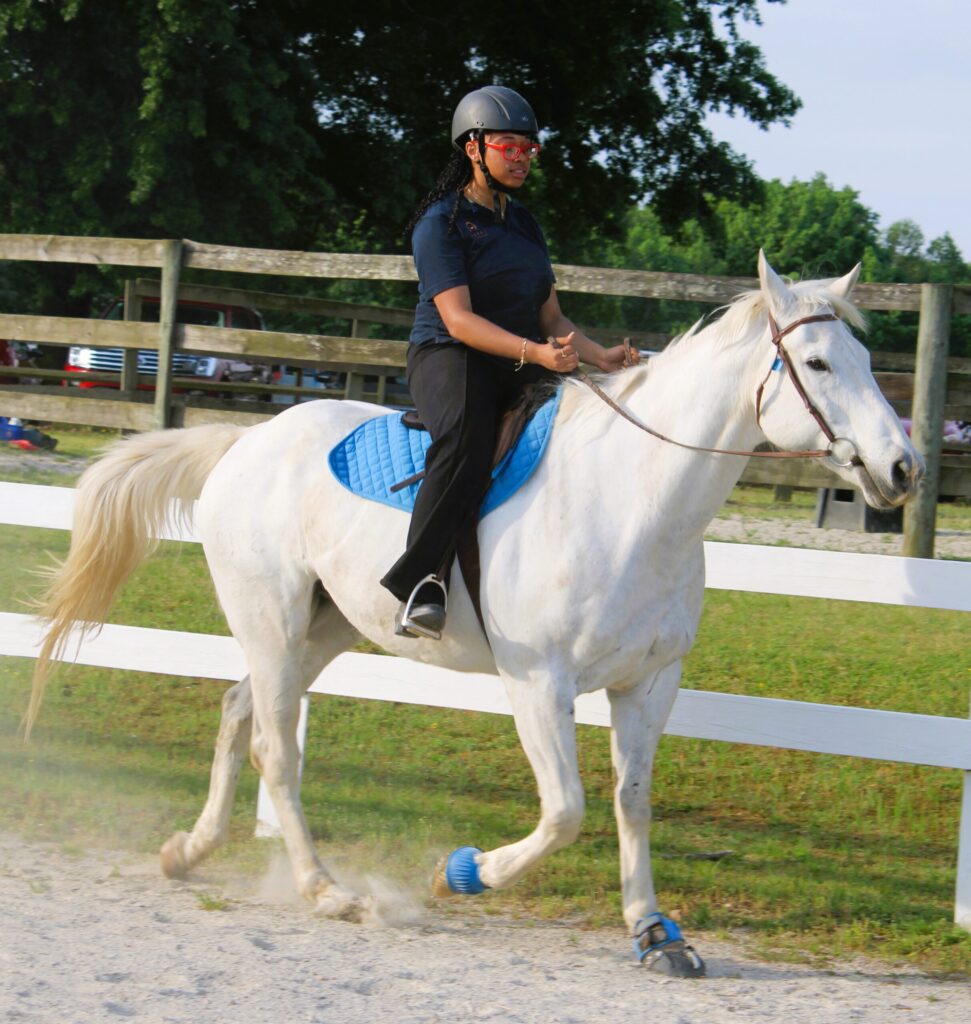
A Personal Note: balance is not just “for the girls”
This year, I learned that even the helpers need help. That you can love what you do with your whole heart and still find yourself completely drained. That compassion—when given constantly and without boundary—can slowly empty you out.
It’s called compassion fatigue, and my body started whispering things my mind didn’t want to hear: slow down, you’re tired, you’re not okay. I had spent so long being strong for others that I had nothing left. It was time for a sabbatical. But after 20 years of leading and teaching, I was out of words to process my experience. There was just too much to say and it was too hard to say it. The healing I needed was in my body.
But through the work I did at CORRAL, I knew two places where words are optional: the barn and the yoga mat.These were the places I could heal.
On Horseback
Horseback riding has always been a part of my life, but this year, it became my lifeline. I had the privilege of training a rescued pony whose nervous system may have been wound tighter than mine.
Starting her demanded that I check in with myself. That I slow down and match my rhythm to another being’s. That I soften my hands and my expectations. It reminded me that leadership can be quiet, that balance is a conversation, and that there’s strength in stillness.
The barn became a place where I didn’t have to carry anyone else’s emotions. I could just be. And that was enough.
On the Mat
And to show up for her, I devoted myself to a daily practice of Ashtanga yoga, a practice rooted in breath, movement and mindfulness. It gave me structure when everything felt chaotic. Each posture challenged me to meet myself where I was—not where I used to be, not where I thought I should be, but right here, right now.
In Ashtanga, I learned that consistency is more powerful than intensity. That healing isn’t a performance, but a practice. And that balance is not static—it’s something you feel and adjust moment by moment.
What I’ve Learned
Between the horse and the mat, I’ve found space to reconnect with myself. To rebuild from the inside out. To feel whole again.
I’ve learned that compassion is most sustainable when it includes me. And that balance—true, embodied balance—is not about having it all together. It’s about being willing to come back to center, again and again.
This year, I’ve returned to myself. And I’m still returning, every day to find balance for me and my equine partner.
Why It Matters
Mental Health Awareness Month is a reminder that healing doesn’t happen in isolation or all at once. It happens through a consistent practice of balance, in connection with others. For the girls at CORRAL, horseback riding provides a path to reclaim balance—on the horse, and in themselves.
Because the greatest victories aren’t just about ribbons or perfect transitions. They’re about a girl learning to trust her own body. To quiet her mind. To speak up. To soften. To lead. And to believe that balance—true, lasting, life-giving balance—is possible.
Influences:
- Natural Lifemanship – Trauma-focused equine-assisted therapy based in neuroscience
- Dressage Naturally – Training at the intersection of Classical Dressage & Natural Horsemanship
- Ecole di Legerete – High school dressage rooted in maintaining balance of horse and rider
- Buck Brannaman – One of the world’s leading practitioners based on classical concepts from the California vaquero tradition; working with the horse’s nature, using an understanding of how horses think and communicate to train the horse
- Mark Rashid – Mark’s life work is focused on developing internal and external softness.
- Jim Masterson – With The Masterson Method®, you learn to recognize and use the responses of the horse to find and release tension
- Maria Michaeler – Combines the inspiring wisdom of Ashtanga Yoga with the magic of the parampara, the connection between student and teacher—a connection that lasts for several years, with gentle regularity

